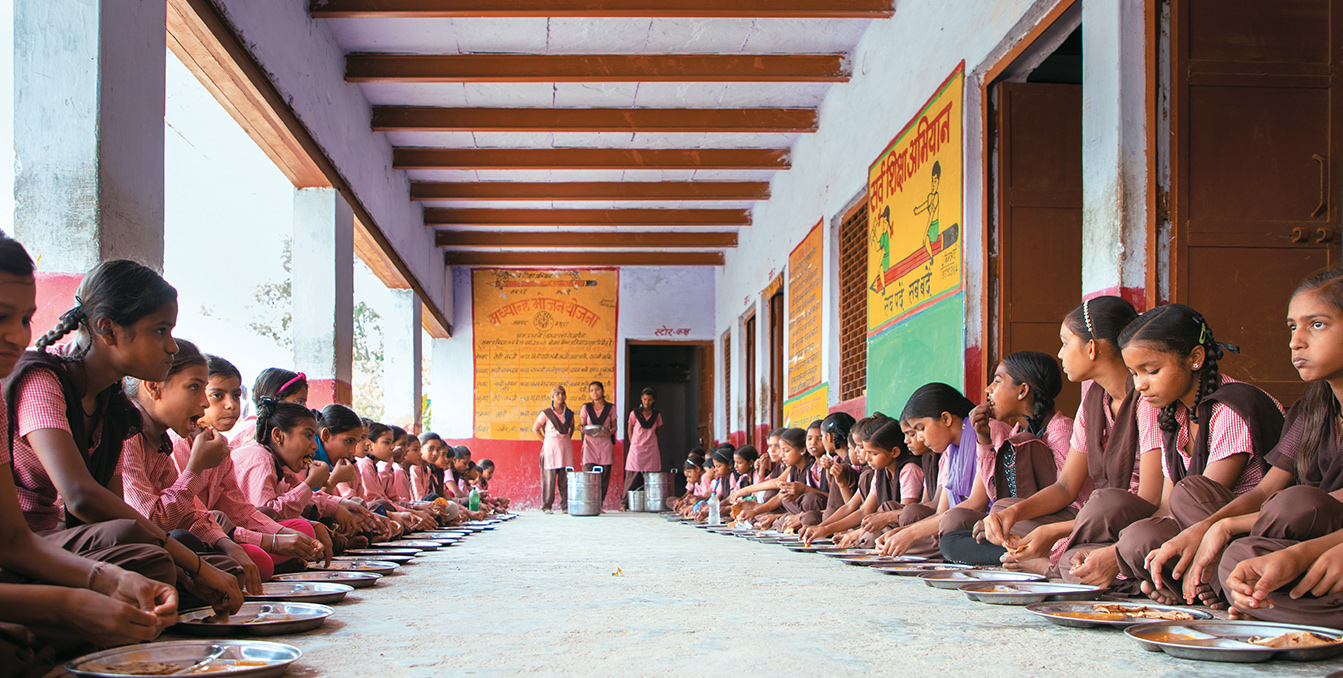
CREATING SHARED VALUE | SHAPING A BETTER FUTURE FOR OUR COMMUNITIES
Pernod Ricard India Foundation
Pernod Ricard India (P) Ltd (PRIPL) is a wholly owned subsidiary of Pernod
Ricard SA. Globally, Pernod Ricard is the world's co-leader in wines and spirits
with a consolidated Sales of ¤8,987m in FY18, a 6% organic sales growth.
Pernod Ricard India Foundation’s (PRIF) focus areas are based on the United
Nations Sustainable Development Goals (SDGs), national priorities, CSR landscape
and community needs, for the sustainable development of society. The strategic
programs under the SDGs are focused on: Healthcare: Ensuring healthy lives and
encouraging well-being for all; Education: Ensure inclusive and equitable
quality
education and promote lifelong learning opportunities for all; Water
Conservation:
Implementing integrated water resources development and management at all
levels in communities; Safe Drinking Water: Achieving equitable access to safe
and
affordable drinking water for all; Sanitation & Hygiene: Providing
infrastructural
support and strengthen the participation of local communities in improving
sanitation and hygiene; Livelihoods: Promote sustained, inclusive and
sustainable
economic growth, as well as full and productive employment for all through
skill-based livelihood development; Life on Land: Protect, restore and promote
sustainable use of terrestrial ecosystems.
Incentivising the children
to attend schools more regularly and improving the
nutritional profile of the children.
PRIF has taken a strong
initiative to ensure more children attend school. It has also
ensured that girl children get an inclusive and equitable quality education. PRI
Foundation sponsors nutritious meals for children at government schools.
This
has helped many children to benefit from Mid-Day Meal Program, serving
wholesome food prepared in state-of-the-art kitchens. The intervention by PRI
Foundation has not only increased the attendance of the girl child but also
improved
their health.
1500 school children across Lucknow have been benefited by the Nutritious
Meal Programs by PRIF.
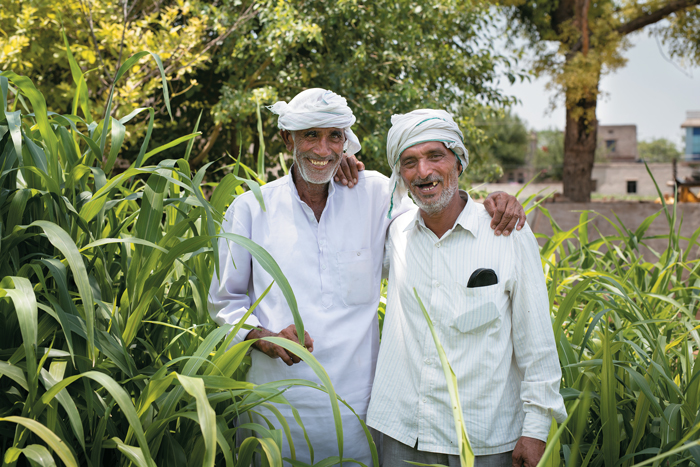
Water conservation and reduction of water waste, particularly in areas where there is scarcity for water,are at the core of the program interventions for Pernod Ricard India Foundation (PRIF).
Pernod Ricard India Foundation (PRIF) is committed to help ensure water is
managed
sustainably as a shared, public resource and aims to be India’s leading
corporate guardian of
this natural resources. Being efficient stewards and managing the impact on
water remains
highest environmental priority for PRIF under the 360-degree Water
Stewardship Program.
These interventions have been operational across several states, delivering
notable benefits to
communities, citizens and the environment.
Our program “Samridhi”, in
Behror block, Alwar, Rajasthan, being implemented by our partner, S M Sehgal
Foundation, seeks to capture, conserve and harvest rainwater with
the construction of watershed structures, improve farm livelihoods to bring
prosperity to
more than 8,000 villagers around the plant, through promotion of
water-saving agriculture
practices; and digital literacy and life skills education for youth.
Project Samridhi is an integrated three-year
project benefiting five villages of Karoda,
Antpura, Untoli, Banhad, and Maharajawas, leading to Water Stewardship and
Improving
Farm Livelihoods. The project will create and rejuvenate ponds for surface water
storage
that can be used by communities for domestic, irrigation and animal husbandry
purposes;
create groundwater recharge structures viz; nala, bunds and recharge wells;
construct
soak wells for wastewater management and groundwater recharge; promote
water-saving
irrigation practices; and facilitate digital literacy and life skills education
classes. Community
engagement will be an integral part of the project with continuous capacity
building and
training.
In addition, PRIF under Samridhi project has undertaken pond
development and recharge
well program in six villages of Behror. “We started the awareness program in
January 2019 in
the six villages, and village level committees have been set up. They
participate in the activity
with full financial and physical contributions, as they understand the
importance of water
conservation, better farm management and low investment and high returns,” says
Mahipal
Singh.
Under this project, 150 acres of farmland will be brought into water
conservation. “We have
seen about 25% increase in production with 40% less water usage through mini
sprinklers,”
says Singh.
PRIF announces scholarship program to support higher education. The scholarships will be awarded to the students pursuing SSC, HSC, graduate and postgraduate studies in colleges and universities, and for professional courses such as Medical, Engineering, etc. The program has been initiated with implementation partner – Youth Development Foundation.
PRIF with its implementation partner has been promoting smallholder horticulture programs, agriculture productivity enhancement and community institutions in the form of SHGfederations in Madhya Pradesh. 130 Women Producer Groups formed in the state, who will be directly linked to village level collection centers. The produce will be sold to an apex Farmer Producer Organization, of which the WPGs will form a major part. The women in these collectives will hence be linked to greater market linkages for their locally run enterprises
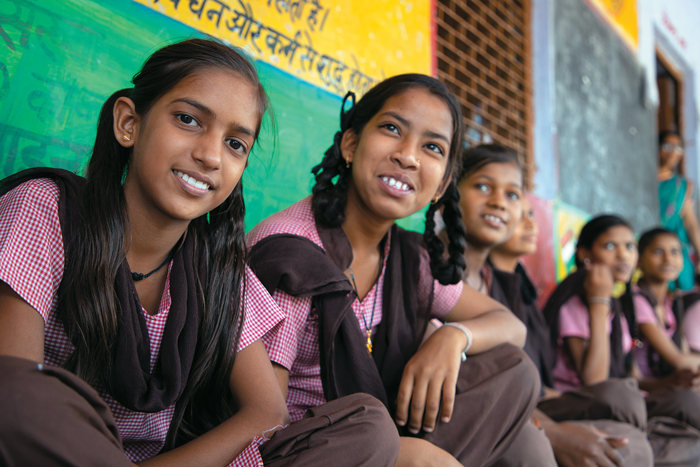
Pernod Ricard India Foundation announces scholarship program to support higher education. The scholarships will be awarded to the students pursuing SSC, HSC, graduate and postgraduate studies in colleges and universities, and for professional courses such as Medical, Engineering etc.
The intervention began in 2006. Farmer,
Ghansham Gosh
says, “We used to sow wheat in 8-10 acres of land and get a
return of Rs. 50-60,000. Now in just half acre land farming of
Pomegranate has yielded Rs. 20,000 in the first year and Rs.
40,000 in the second year.”
At village Barmadang in Bundelkhand's
Tikamgarh, women
farmers have played an important role in Custard apple farming.
“They have also gone ahead and successfully undertaken
marketing which has helped improve their income,” says Vikas,
project executive with Surjan.
Non-Timber Forest Produce (NTFP) is a major source of income for many tribal and non-tribal community across the country. PRIF has been promoting value chain of NTFP since 2014 in Rajasthan, Madhya Pradesh, Telangana and Maharashtra. Custard apple is major product, whereas there are black plum, aamchur and chironji in small scale. In every state, practices of NTFP collection, procurement, processing and marketing are area specific. This workshop is organised to list out all those area specific practices of value addition and knowledge to share that among teams. The success of this project at Chindwara has set a major benchmark in women selfhelp group functioning.
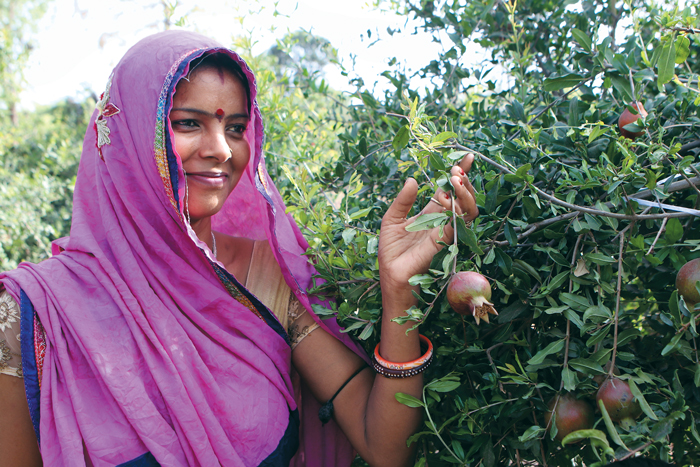
The National Research Centre for Pomegranate (NRCP) did soil testing and found that the soil was similar to soil in Maharashtra. Women farmers were encouraged to grow pomegranate, and success has led to more than 200 farmers growing pomegranate today.
One of PRIF's key goals is to recharge/reuse more water than what its operations consume. Believing that the impact on water extends beyond its own operations, it is committed to continuously engage in several sustainability initiatives to protect and preserve water to make it safely available to millions of citizens in India’s hinterlands who lack access to it. This is being actualised by first replenishing water in water-stressed areas or in the local area of operations through interventions of over 30 rainwater harvesting and recharge structures, over 50 ponds, dams and desilting projects in Chhattisgarh, Nashik (Maharashtra), Behor and Phagi (Rajasthan), Kolar (Karnataka) and Medak (Telangana).
Providing clean, accessible water to communities is one of PRIF’s key priorities under the Water Stewardship Program. Over 30 water ATMs, and deep tube wells have been helping more than 100,000 people get access to safe and clean drinking water in Nagpur, Behror, Nashik and across West Bengal. Concurrently, revival of wetlands and lakes in line with the Group’s biodiversity upgrade plan has helped regenerate the Kudikunta Lake in Hyderabad, and the Hauz Khas lake in the Capital, helping the neighbouring demographic access fresh air and energising the biodiversity. PRIF aims to strategically approach societal development in alignment with global commitments, the SDGs. Its programs and interventions are planned and monitored. A key aspect of the programs is a sustainable community-led model.
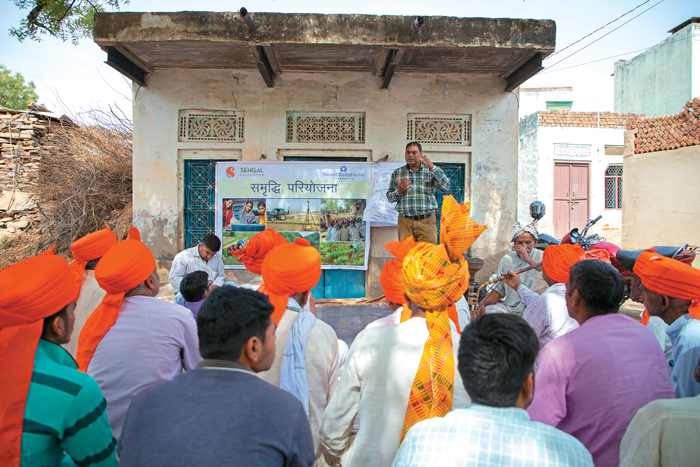
Gram Sangathan at Untoli village, Behror is conducting a meeting with the local committee. This important intervention by PRIF has helped villagers become self-sufficient in the management of local work for the betterment of village and the community under the Samridhi program.
Gram Sangathan at Untoli village, Behror is conducting a meeting with the local committee. This important intervention by PRIF has helped villagers become self-sufficient in the management of local work for the betterment of village and the community under the Samridhi program.

SUNIL DUGGAL
VP, Corporate Affairs and Communication, Pernod Ricard India
How do you set the CSR objectives for the company in India?
Pernod Ricard India’s corporate
social responsibility what
we call as Sustainability and
Responsibility, purpose is to
enhance quality of life and
contribute to a healthier future,
by creating Shared Value. The
practice of integrating shared
value into business strategy
translates as re-conceiving a
business model around a social
issue, and implementing shared
value approaches at either the
initiative or enterprise level.
All our programs are aligned
to United Nations SDGS, and provide us with a common
language to contribute to
India’s developmental goals
and then measure how we are
also contributing to the world’s
Sustainability. We follow a
very structured approach
–understanding the social,
economic and environmental
concerns, through community
engagements and needassessments
across our facilities.
What are the critical interventions and outcomes that make each employee proud?
Our interventions are aligned
to the UN Global Goals for
Sustainable Development. We are
committed towards stewarding
the planet’s natural resources for
future generations, with focus
on water. Key interventions
are focused towards providing
clean water and sanitation, safe
and affordable drinking water,
employability and livelihood,food security, promoting
health well-being, education
(including education to girl
child), sustainable management
of natural resources, employee
volunteering programs, and many
others.
Our employees take immense
pride in the way our programs
are touching lives and bringing
positive change to communities.
Do you think that volunteerism in India is still to take off in many sectors?
India has a rich history of
volunteerism by way of cultural
interaction and religious
commitments, philanthropy and
value systems embedded within
Indian society. Many private
and public-sector companies
have carried forward this legacy,
engaging in volunteering program
from time to time. However, in
recent years, a positive outlook
towards volunteering can be
witnessed among individuals and employees. Corporate
volunteering has transitioned
from a one-off activity to more
meaningful and impact-oriented
term projects.
At Pernod Ricard India, our
employees are provided with
vast opportunities to volunteer
for the causes they believe in.
An outstanding example of
PRI’s employee volunteering
program is Responsib’ALL Day,
observed in June every year. All
18,500 Pernod Ricard employees
across the globe devote their
time towards volunteering for a
social cause. This year, the theme
is Circular Transformation,
aligned to SDG 12 – Responsible
Consumption and Production.
PRI Employees have been
dedicatedly volunteering towards
creating sustainable play-spaces
in government schools, for
underprivileged children, by
re-using waste tyres and scrap
materials in commitment to this
year’s theme of Responsib’All Day.
Sailesh (in the front), a class VIII student at a Government school in Lucknow wants to become a painter. She, like her friends and classmates, is thankful that free food is served in school. It is hot and like home cooked and the menu changes every day, says Sailesh. She is happy that good food is served in school.
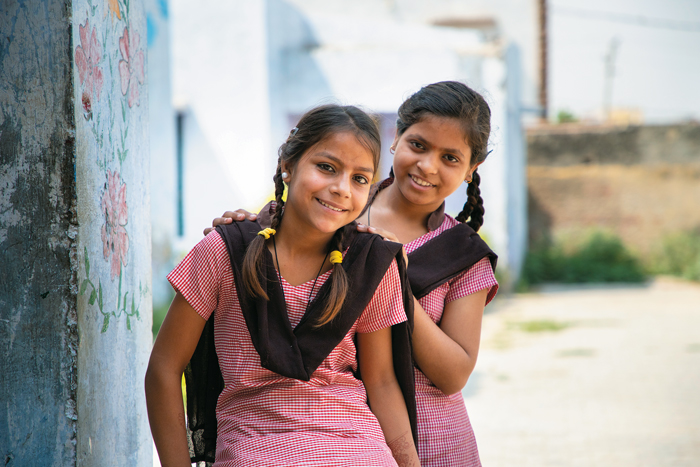
Vandana (in the back) a class VIII student at a Government school in Lucknow wants to become a teacher. She finds the food tasty and nutritious. She is among the many students who have been consuming food in the school for the past few years since PRI FOUNDATION began providing it.





